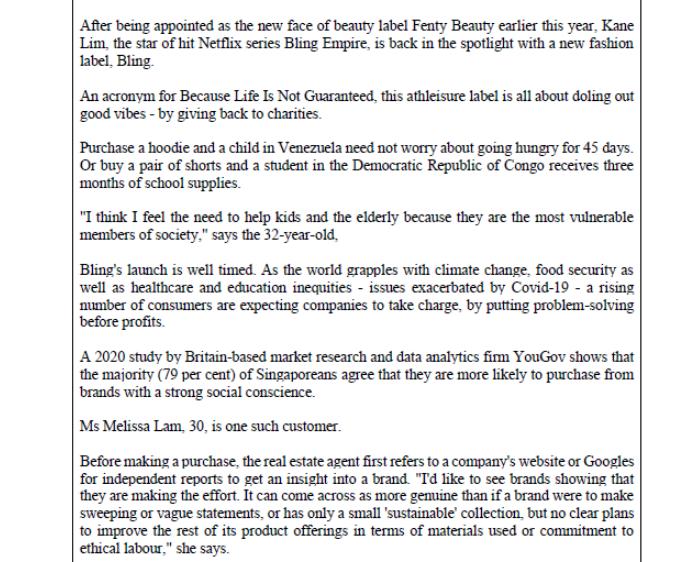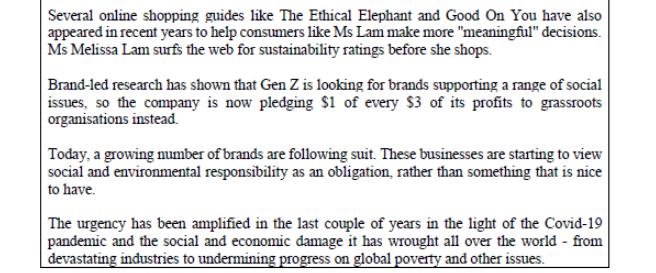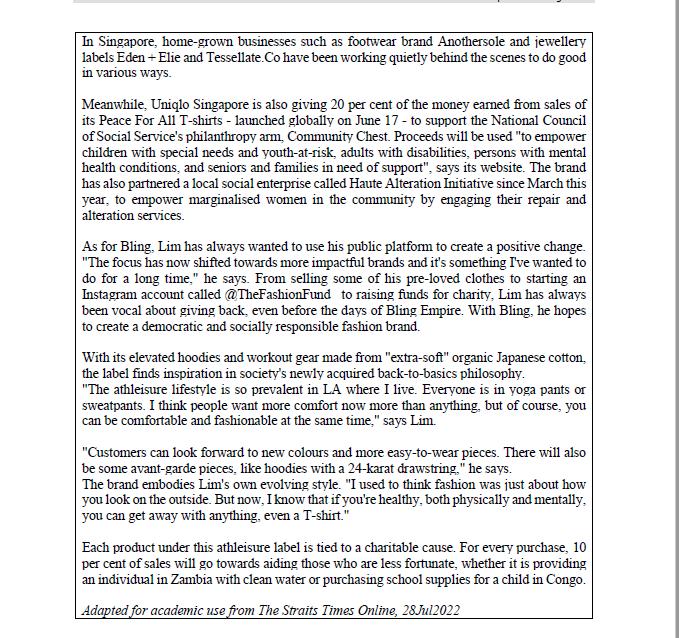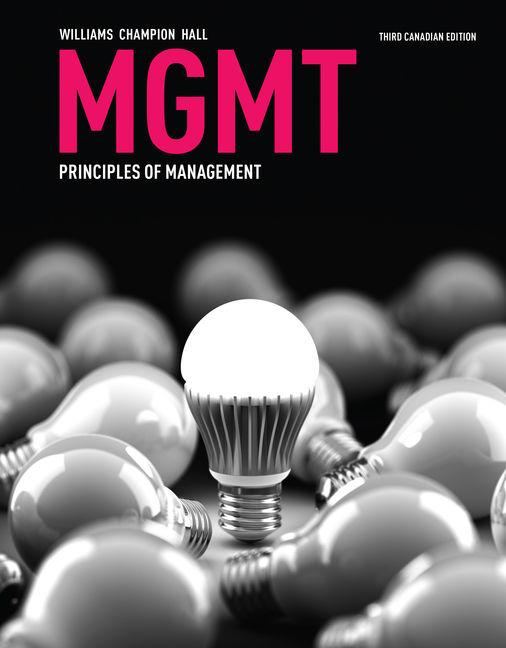Answered step by step
Verified Expert Solution
Question
1 Approved Answer
After being appointed as the new face of beauty label Fenty Beauty earlier this year, Kane Lim, the star of hit Netflix series Bling




After being appointed as the new face of beauty label Fenty Beauty earlier this year, Kane Lim, the star of hit Netflix series Bling Empire, is back in the spotlight with a new fashion label, Bling. An acronym for Because Life Is Not Guaranteed, this athleisure label is all about doling out good vibes - by giving back to charities. Purchase a hoodie and a child in Venezuela need not worry about going hungry for 45 days. Or buy a pair of shorts and a student in the Democratic Republic of Congo receives three months of school supplies. "I think I feel the need to help kids and the elderly because they are the most vulnerable members of society," says the 32-year-old, Bling's launch is well timed. As the world grapples with climate change, food security as well as healthcare and education inequities - issues exacerbated by Covid-19 - a rising number of consumers are expecting companies to take charge, by putting problem-solving before profits. A 2020 study by Britain-based market research and data analytics firm YouGov shows that the majority (79 per cent) of Singaporeans agree that they are more likely to purchase from brands with a strong social conscience. Ms Melissa Lam, 30, is one such customer. Before making a purchase, the real estate agent first refers to a company's website or Googles for independent reports to get an insight into a brand. "T'd like to see brands showing that they are making the effort. It can come across as more genuine than if a brand were to make sweeping or vague statements, or has only a small 'sustainable' collection, but no clear plans to improve the rest of its product offerings in terms of materials used or commitment to ethical labour," she says. Several online shopping guides like The Ethical Elephant and Good On You have also appeared in recent years to help consumers like Ms Lam make more "meaningful" decisions. Ms Melissa Lam surfs the web for sustainability ratings before she shops. Brand-led research has shown that Gen Z is looking for brands supporting a range of social issues, so the company is now pledging $1 of every $3 of its profits to grassroots organisations instead. Today, a growing number of brands are following suit. These businesses are starting to view social and environmental responsibility as an obligation, rather than something that is nice to have. The urgency has been amplified in the last couple of years in the light of the Covid-19 pandemic and the social and economic damage it has wrought all over the world - from devastating industries to undermining progress on global poverty and other issues. In Singapore, home-grown businesses such as footwear brand Anothersole and jewellery labels Eden +Elie and Tessellate.Co have been working quietly behind the scenes to do good in various ways. Meanwhile, Uniqlo Singapore is also giving 20 per cent of the money earned from sales of its Peace For All T-shirts - launched globally on June 17 - to support the National Council of Social Service's philanthropy arm, Community Chest. Proceeds will be used "to empower children with special needs and youth-at-risk, adults with disabilities, persons with mental health conditions, and seniors and families in need of support", says its website. The brand has also partnered a local social enterprise called Haute Alteration Initiative since March this year, to empower marginalised women in the community by engaging their repair and alteration services. As for Bling. Lim has always wanted to use his public platform to create a positive change. "The focus has now shifted towards more impactful brands and it's something I've wanted to do for a long time," he says. From selling some of his pre-loved clothes to starting an Instagram account called @TheFashionFund to raising funds for charity, Lim has always been vocal about giving back, even before the days of Bling Empire. With Bling, he hopes to create a democratic and socially responsible fashion brand. With its elevated hoodies and workout gear made from "extra-soft" organic Japanese cotton. the label finds inspiration in society's newly acquired back-to-basics philosophy. "The athleisure lifestyle is so prevalent in LA where I live. Everyone is in yoga pants or sweatpants. I think people want more comfort now more than anything, but of course, you can be comfortable and fashionable at the same time," says Lim. "Customers can look forward to new colours and more easy-to-wear pieces. There will also be some avant-garde pieces, like hoodies with a 24-karat drawstring." he says. The brand embodies Lim's own evolving style. "I used to think fashion was just about how you look on the outside. But now, I know that if you're healthy, both physically and mentally. you can get away with anything, even a T-shirt." Each product under this athleisure label is tied to a charitable cause. For every purchase, 10 per cent of sales will go towards aiding those who are less fortunate, whether it is providing an individual in Zambia with clean water or purchasing school supplies for a child in Congo. Adapted for academic use from The Straits Times Online, 28Jul2022 Appraise the various advertising strategic formats and recommend any two (2) that you would use for Bling. (30 marks) Select and evaluate any two (2) media most suitable for Bling.
Step by Step Solution
★★★★★
3.29 Rating (152 Votes )
There are 3 Steps involved in it
Step: 1
To effectively promote the Bling athleisure brand which is positioned as charitable and socially responsible the advertising strategy should align wit...
Get Instant Access to Expert-Tailored Solutions
See step-by-step solutions with expert insights and AI powered tools for academic success
Step: 2

Step: 3

Ace Your Homework with AI
Get the answers you need in no time with our AI-driven, step-by-step assistance
Get Started


